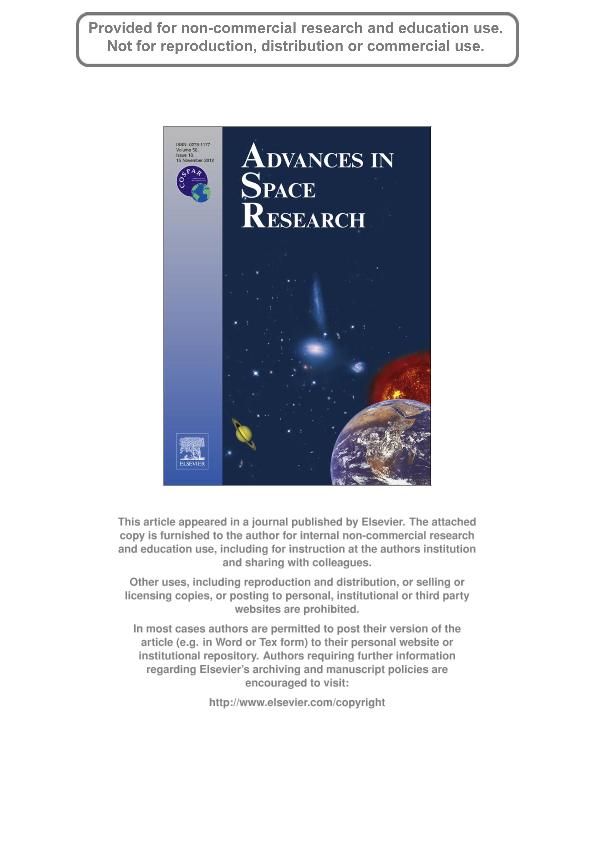Mostrar el registro sencillo del ítem
dc.contributor.author
Cionco, Rodolfo Gustavo

dc.contributor.author
Compagnucci, Rosa Hilda

dc.date.available
2023-03-06T10:49:02Z
dc.date.issued
2012-07
dc.identifier.citation
Cionco, Rodolfo Gustavo; Compagnucci, Rosa Hilda; Dynamical characterization of the last prolonged solar minima; Elsevier; Advances in Space Research; 50; 10; 7-2012; 1434-1444
dc.identifier.issn
0273-1177
dc.identifier.uri
http://hdl.handle.net/11336/189615
dc.description.abstract
The planetary hypothesis of the solar cycle is an old idea in which the gravitational influence of the planets has a non-negligible effect on the causes of the solar magnetic cycle The advance of this hypothesis is based on phenomenological correlations between dynamical parameters of the Sun's movement around the barycentre of the Solar System and sunspots time series; and more especially, identifying relationships linking solar barycentric dynamics with prolonged minima (especially Grand Minima events) However, at present there is no clear physical mechanism relating these phenomena The possible celestial influence on solar cycle modulation is of great importance not only in solar physics but also in Earth sciences, because prolonged solar minima have associated important climatic and telluric variations, in particular, during the Maunder and Dalton Minimum In this work we looked for a possible causal link in relation with solar barycentric dynamics and prolonged minima events We searched for particular changes in the Sun's acceleration and concentrated on long-term variations of the solar cycle We show how the orbital angular momentum of the Sun evolves and how the inclination of the solar barycentric orbit varies during the epochs of orbital retrogressions In particular, at these moments, the radial component of the Sun's acceleration (i.e.; in the barycentre-Sun direction) had an exceptional magnitude These radial impulses occurred at the very beginning of the Maunder Minimum, during the Dalton Minimum and also at the maximum of cycle 22 before the present extended minimum We also found a strong correlation between the planetary torque and the observed sunspots international number around that maximum We apply our results in a novel theory of Sun-planets interaction that it is sensitive to Sun barycentric dynamics and found a very important effect on the Sun's capability of storing hypothetical reservoirs of potential energy that could be released by internal flows and might be related to the solar cycle This process begins about 40 years before the solar angular momentum inversions, i.e.; before Maunder Minimum, Dalton Minimum, and before the present extended minimum Our conclusions suggest a dynamical characterization of peculiar prolonged solar minima We discuss the possible implications of these results for the solar cycle including the present extended minimum.
dc.format
application/pdf
dc.language.iso
eng
dc.publisher
Elsevier

dc.rights
info:eu-repo/semantics/openAccess
dc.rights.uri
https://creativecommons.org/licenses/by-nc-sa/2.5/ar/
dc.subject
GRAND MINIMA EVENTS
dc.subject
SOLAR ACTIVITY
dc.subject
SUN-EARTH CONNECTION
dc.subject
SUN-PLANETS INTERACTIONS
dc.subject.classification
Astronomía

dc.subject.classification
Ciencias Físicas

dc.subject.classification
CIENCIAS NATURALES Y EXACTAS

dc.title
Dynamical characterization of the last prolonged solar minima
dc.type
info:eu-repo/semantics/article
dc.type
info:ar-repo/semantics/artículo
dc.type
info:eu-repo/semantics/publishedVersion
dc.date.updated
2023-03-05T15:36:21Z
dc.journal.volume
50
dc.journal.number
10
dc.journal.pagination
1434-1444
dc.journal.pais
Países Bajos

dc.journal.ciudad
Amsterdam
dc.description.fil
Fil: Cionco, Rodolfo Gustavo. Consejo Nacional de Investigaciones Científicas y Técnicas; Argentina. Universidad Tecnológica Nacional. Facultad Regional San Nicolás; Argentina
dc.description.fil
Fil: Compagnucci, Rosa Hilda. Universidad de Buenos Aires. Facultad de Ciencias Exactas y Naturales. Departamento de Ciencias de la Atmósfera y los Océanos; Argentina. Consejo Nacional de Investigaciones Científicas y Técnicas; Argentina
dc.journal.title
Advances in Space Research

dc.relation.alternativeid
info:eu-repo/semantics/altIdentifier/doi/http://dx.doi.org/10.1016/j.asr.2012.07.013
Archivos asociados
